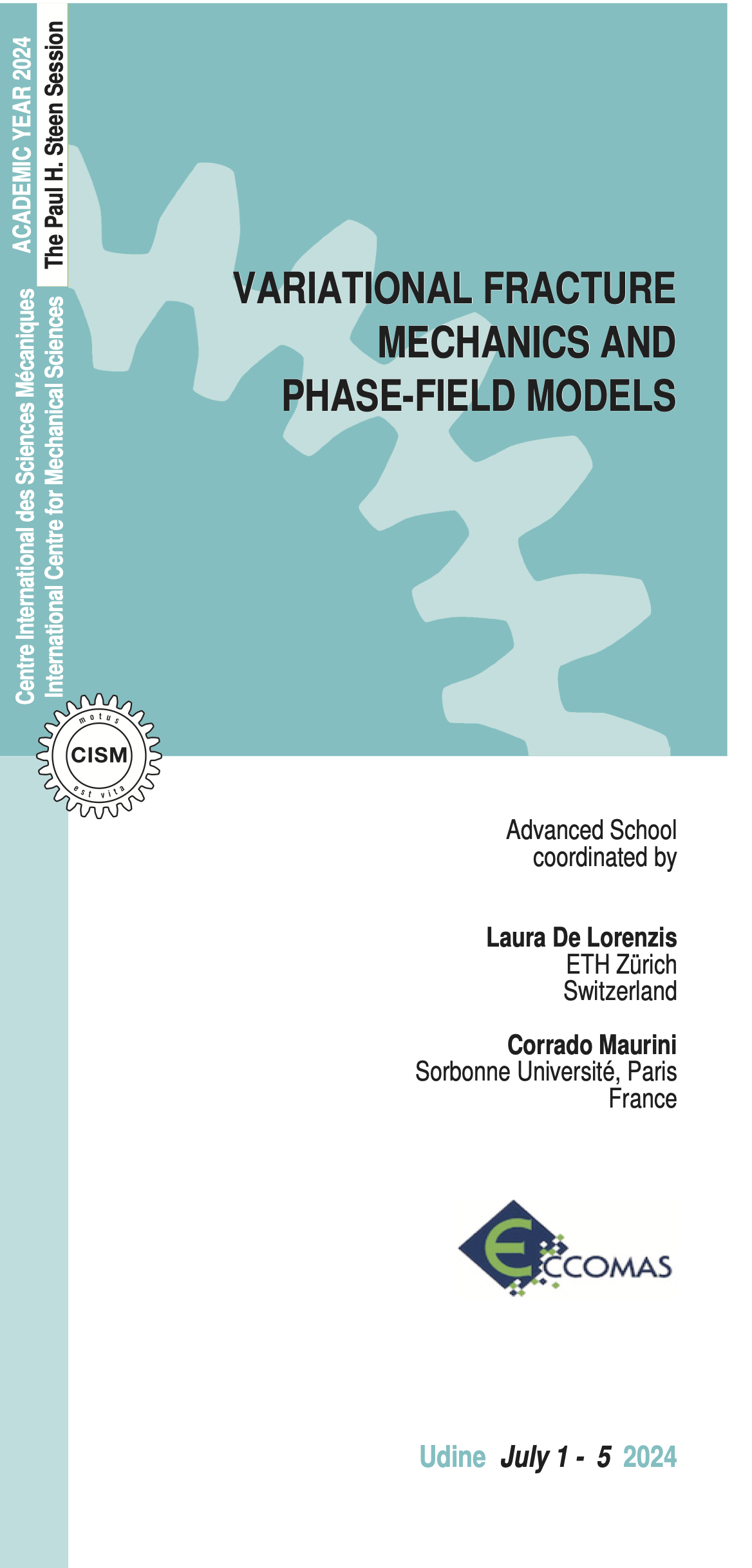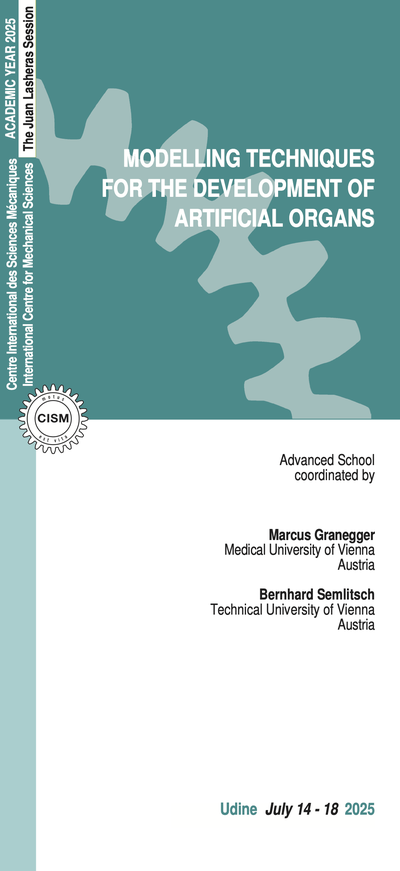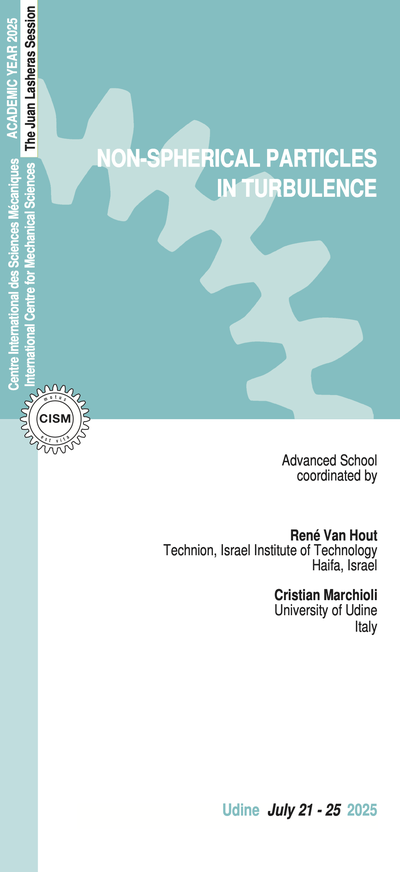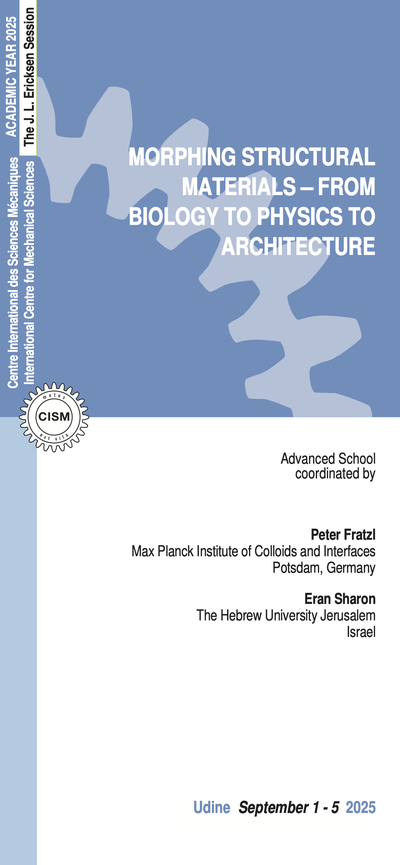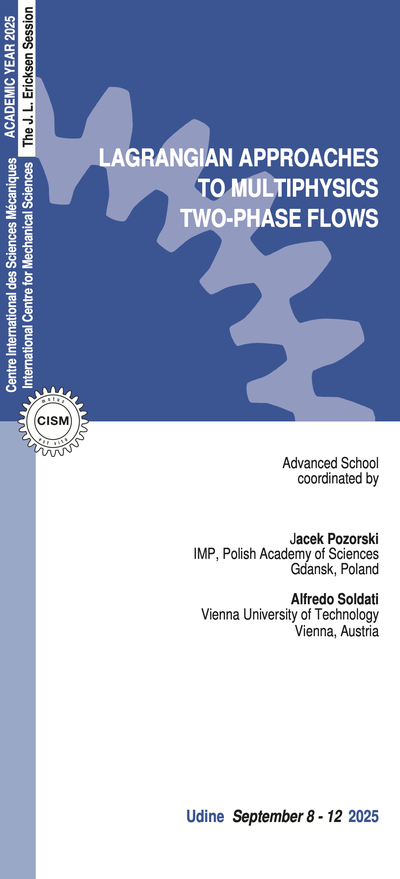The goal of this course is to provide to graduate students, young researchers and engineers a complete and multidisciplinary presentation of the variational phase-field approach to fracture.
This new paradigm for the theoretical and computational treatment of damage and fracture has emerged in the past two decades as a game changer for both theory and applications and has attracted large attention in the broad fracture mechanics community as well as from industry. The lecturers will present phase-field fracture modeling in the framework of the variational Griffith’ theory of fracture mechanics and its variational regularization, of gradient damage models, as well as of phase-field modeling for phase transformations widely used in material science. Overviews of current research topics and open issues will be provided. Lectures on the theoretical and mathematical aspects will be complemented by hands-on tutorials introducing the participants to appropriate numerical methods.
The variational phase-field modeling of fracture can be seen as the regularization of the variational approach to fracture (Francfort and Marigo 1998). The lectures by Blaise Bourdin will introduce the basic concepts of the variational formulation of brittle fracture. Flaviana Iurlano will give a general introduction to the mathematical notions needed to establish the link between the sharp-crack model and its regularized counterpart (Gamma-convergence). The lectures, addressed to an audience of non-mathematicians, will also highlight the most important mathematical aspects in the larger context of free-discontinuity problems.
The variational phase-field model of fracture can also be constructed as a special class of gradient damage models, thus establishing the link with continuum damage mechanics. The lectures of Laura De Lorenzis and Corrado Maurini will be devoted to the variational derivation of the set of equations which govern the quasi-static evolution of damage in a body, their stability, and the discussion of the related crack nucleation criteria. Reference analytical solutions and extensions to elastoplastic couplings will be presented.
Phase-field modeling as a general framework entails the regularization of problems involving moving interfaces and is a very active area in the larger context of computational material science, fluid mechanics and topology optimization. The lectures by Peter Vorhees will provide a broad overview of the phase-field method, starting from its thermodynamics, and will highlight different classes of models involving conserved and unconserved phase-field variables.
A primary advantage of the phase-field framework lies in its flexibility and performance in numerical computations. Ensuring robust computations and obtaining accurate results is not trivial. Numerical aspects will be the focus of the lectures by Jack Hale. He will first introduce basic concepts of linear and non-linear solvers and parallel computing, then focus specifically on non-linear coupled phase-field computations involving incremental constrained minimization, and finally provide hands-on numerical examples using the FEniCS Project finite element framework.
Alessi R., Marigo J.-J., Vidoli S., 2014. Gradient damage models coupled with plasticity and nucleation of cohesive cracks. Arch. Ration. Mech. Anal. 214 (2), 575–615.
Boettinger W. J., Warren J A., Beckermann C., Karma, A.. "Phase-field simulation of solidification." Annual review of materials research 32, no. 1 (2002): 1a63-194.
Bourdin B., Francfort G. A., and Marigo J.-J. The variational approach to fracture. J. Elasticity, 91(1-3):1–148. (2008) https://doi.org/10.1007/s10659-007-9107-3.
Bourdin B., Francfort G.A., Marigo J.-J. Numerical experiments in revisited brittle fracture J. Mech. Phys. Solids, 48 (4) (2000), pp. 797-826 https://doi.org/10.1016/S0022-5096(99)00028-9.
Braides, A, Γ-convergence for beginners, Oxford Lecture Series in Mathematics and its Applications, 22. Oxford University Press, Oxford, 2002. xii+218 pp.
De Lorenzis L., Gerasimov T. Numerical implementation of phase-field models of brittle fracture. In: Modeling in Engineering using Innovative Numerical Methods for Solids and Fluids (2020). Springer International Publishing, Cham, pp.75–101.
Dokken S, et al. “The FEniCSx Tutorial”. Web (2023): https://jsdokken.com/dolfinx-tutorial/.
Lorentz E., Cuvilliez S., Kazymyrenko. K. Convergence of a gradient damage model toward a cohesive zone model. Comptes Rendus Mécanique, 339 (2011) pp.20–26 https://dx.doi.org/10.1016/j.crme.2010.10.010.
Marigo J.-J., Maurini C., Pham K. An overview of the modelling of fracture by gradient damage models. Meccanica, 51 (2016), pp. 3107–3128, doi: 10.1007/s11012-016-0538-4.
Provatas N., and Elder K. Phase-field methods in materials science and engineering. John Wiley & Sons, 2011.
Steinbach, I., Phase-field model for microstructure evolution at the mesoscopic scale. Annual Review of Materials Research 43 (2013): 89-107.
Tanné E. et al., Crack nucleation in variational phase-field models of brittle fracture, J. Mech. Phys. Solids, 110 (2018), pp. 80-99, https://doi.org/10.1016/j.jmps.2017.09.006.
6 lectures on: Variational formulation of damage models. Overview of current research topics and open issues: multiaxiality, compression, anisotropy, non-uniqueness, dynamics.
6 lectures on: Introduction to the FEniCS Project and parallel computing (MPI), Numerical implementation of phase-field fracture models.
6 lectures on: Introduction to the mathematical aspects of phase-field models: Gamma-convergence; Phase-field models for phase transitions and fracture.
5 lectures on: Stability of solutions and crack nucleation criteria in variational phase-field models. Variational approach to coupled damage and plasticity models.
6 lectures on: The general phase-field modeling framework: thermodynamics; models for conserved and non-conserved order parameters; the phase-field method as a computational tool, microstructure and fracture.
ADMISSION AND ACCOMMODATION
The course is offered in a hybrid format, allowing participants the flexibility to attend either in person or remotely via the Microsoft Teams platform.
Limited spots are available for on-site attendance and will be allocated on a first-come, first-served basis.
The registration fees are:
- On-site participation: 600.00 Euro + VAT*
Includes a complimentary bag, five fixed menu buffet lunches, hot beverages, downloadable lecture notes.
Deadline for on-site application is June 1, 2024.
- Live Streaming Online Participation: 250.00 Euro + VAT*
Includes downloadable lecture notes.
Deadline for online application is June 19, 2024.
Application forms should be submitted online through the website: http://www.cism.it.
A confirmation message will be sent to accepted participants.
Upon request, a limited number of on-site participants can be accommodated at CISM Guest House at the price of 35 Euro per person/night (contact: foresteria@cism.it)
* where applicable (bank charges are not included) - Italian VAT is 22%.
CANCELLATION POLICY
Applicants may cancel their registration and receive a full refund by notifying the CISM Secretariat in writing (via email) no later than:
- June 1, 2024 for on-site participants (no refunds after the deadline);
- June 19, 2024 for online participants (no refunds after the deadline).
Cancellation requests received before these deadlines will be subject to a 50.00 Euro handling fee. Incorrect payments are also subject to a 50.00 Euro handling fee.
GRANTS
A limited number of participants from universities and research centres who do not receive support from their own institutions can request a waiver of the registration fee and/or free lodging.
Requests should be sent to the CISM Secretariat by May 1, 2024, along with the applicant's curriculum vitae and a letter of recommendation from the head of the department or a supervisor confirming that the institute cannot provide funding. Preference will be given to applicants from countries that sponsor CISM.
